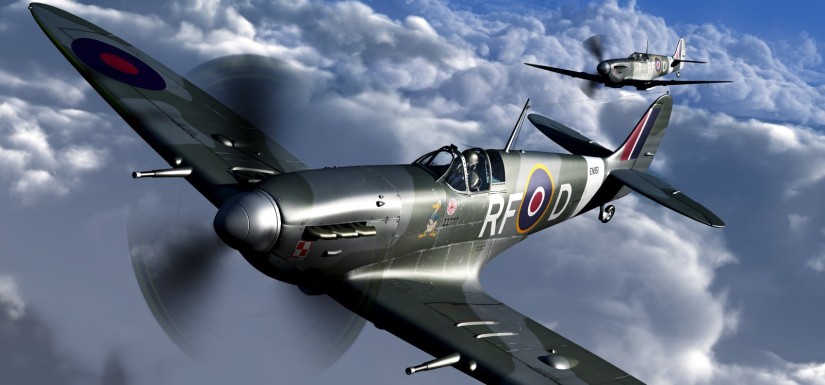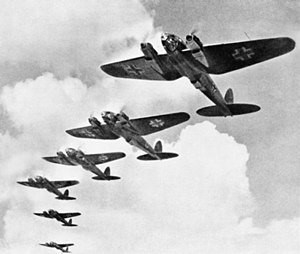The school year approaches, lesson plans are coming together, and I’m finally getting around to another history article. (Pause for applause and cheering…still pausing…c’mon, you know you’re excited! 🙂 )
As promised in After Dunkirk: The Fall of France, today we’ll pick up with THE BATTLE OF BRITAIN. *

What image comes to mind when you hear the word ‘battle?’ Guns, tanks, and infantry slugging it out over a scorched and blasted landscape?
The Battle of Britain actually prevented such scenes from reaching the southern shores of England.
Hitler’s armies had seen great success in 1940. France had fallen. Italy had joined the Axis. The continent of Europe was effectively subdued. The world waited to see if Great Britain, the last standing Ally, would capitulate to Hitler, or fight on.
According to Winston Churchill, there was never any question, even in private meetings, of giving in.
Though their resolve was strong, their position was dangerous. His volume, The Second World War: Their Finest Hour, chronicles the dire situation his country faced.
“For the first time in a hundred and twenty five years a powerful enemy was now established across the narrow waters of the English Channel. Our re-formed Regular Army, and the larger but less well-organized Territorials, had to be organized and deployed to create an elaborate system of defenses, and to stand ready, if the invader came, to destroy him- for there could be no escape.” (Churchill 174)
The British surmised, rightly, that Hitler’s next move would be to conquer their island nation. In the brief respite as the Germans regrouped post-France, they worked to create defenses for beaches, anti-tank obstacles, and units of mobile defenders ready to fight in front of the enemy or harry him from behind. Guards protected factories and other tempting sabotage targets. Every effort was made to build up British air power, their best chance at victory.
The last was an especially good move. The German invasion plan, Operation Sea Lion, was contingent on weakening the RAF (Royal Air Force) enough to gain mastery of the skies over the English Channel.
July 10th, 1940, marked the first heavy onslaught.

The initial German plan was to attack British convoys in the Channel and the southern ports from Dover to Plymouth, weakening the areas they intended to invade. The RAF would have to come out to meet them, and would (they hoped) be destroyed.
This first phase failed. Though the British suffered losses, they made the Luftwaffe pay dearly for them.
On August 15th, the Luftwaffe launched about 100 bombers and 40 M.E. 110’s to the north, against Tyneside, with a simultaneous raid of over 800 planes to the south. The Germans hoped that the concentration of RAF planes would be pinned down in the south, and the northern attackers could do as they wished.
The Luftwaffe didn’t account for the provisions already made by British Air Marshal Dowding, and the seven Hurricane or Spitfire squadrons he had withdrawn from the southern fighting to guard against such an eventuality.
Final score: RAF 76, Luftwaffe 34.

In spite of the Allied successes, the Luftwaffe continued to attack relentlessly. Successful bombing raids of RAF airfields and facilities threatened to cripple the effectiveness of the defense.
Fortunately, Hitler’s own people (unintentionally) kept that threat from being carried out.
Some of the heads of the German military were intent on the destruction of British planes so that they could make their invasion happen. Nazi leader and Luftwaffe Commander Herman Goering had another focus. He believed that indiscriminate bombing of civilian targets, such as London, would crush British resistance.

In September, he got his way. However, the attacks on London didn’t work out quite as he had hoped.
“If the enemy had persisted in heavy attacks against the adjacent sectors (to the airfields)…the whole intricate organization of Fighter Command might have been broken down…It was therefore with a sense of relief that Fighter Command felt the German attack turn on London on September 7, and concluded that the enemy had changed his plan…By departing from the classical principles of war, as well as from the hitherto accepted dictates of humanity, he made a foolish mistake.” (Churchill 331)
September 15th marked the Luftwaffe’s greatest concentrated daylight attack on London.
Perhaps the results of this attack can best be summed up by what took place two days later. On September 17th, Hitler decided to postpone Operation Sea Lion indefinitely.
Churchill’s famous praise of the RAF pilots wraps up this bit of history nicely.
“At the summit the stamina and valour of our fighter pilots remained unconquerable and supreme. Thus Britain was saved. Well might I say in the House of Commons, “Never in the field of human conflict was so much owed by so many to so few.” (Churchill 340)
While an invasion of the British Isles was off the table, the population centers remained a target. NEXT History Session: THE BLITZ

If you’re interested in hearing about this period from people who lived it, the BBC collected people’s recollections of World War 2 in an excellent archive. The following link is for the “Battle of Britain” section. http://www.bbc.co.uk/history/ww2peopleswar/categories/c55221



Yay, history lesson! Just shouldn’t be reading this so late at night…woops… 🙂
LikeLiked by 1 person
But then it’s JUST like being back in school…dozing off while trying to focus…NOT that I ever did that. Ever…
LikeLiked by 1 person
Were in that 7:30am Geography class Sexta year? Dozing off was hindered only by singing through all the Soviet capitals again, and again, and again… 😉
LikeLiked by 1 person
Lol! That sounds amazing! I missed that one… My Spanish prof had a very soothing voice though…
LikeLiked by 1 person
Naaaaah, German! Schniztelbanck and all that fruhtzlbeudenya! 😛
LikeLiked by 1 person
Sigh. Missed out on that too. I was going to, but was convinced the other would be more useful- for as much as I remember, I might just as well have been singing along with you guys 😉
LikeLiked by 1 person
Ditto. 🙂
LikeLiked by 1 person
Oh! And Bo got a hold of a magazine that might be up your street: CINEMA RETRO special edition #6. It’s all about the not quite as platinum-famous WWII films. 🙂
LikeLiked by 1 person
oooOOOoooh! Yes, that sounds fun! Well, fun in a war film kind of way. 🙂
LikeLiked by 1 person
I gotcha. 😉
LikeLiked by 1 person
A nice account. It has been said that Churchill’s greatest achievement was the decision to fight on after the loss of France; others wanted to make peace. The Battle of Britain did enough to stop the Nazis winning, for the time being…
LikeLiked by 1 person
Thank you! Yes, it must have been devastating to be pushed out of Europe so quickly- and hard to see how they could continue on. Still, his memoirs say that even before they knew the results from Dunkirk he’d stated that no matter what, they’d fight on. Gutsy! 🙂
LikeLiked by 1 person
This is a very good post. I am a Brit, (from Birmingham), my mom is 94 and she left school at 14 in 1938. At the age of 15 she was making munitions and afterwards she made Lancaster Bombers and Spitfires. Her elder brother went all through the 6 years of the war, he was 18 when it started, and served in Burma amongst other places. My dad was born in 1919 and served as an RAF sergeant throughout the war. He died when I was a baby, so I don’t have much knowledge of his time during the war. Here is a wiki link to where my mom made planes if anyone is interested https://en.wikipedia.org/wiki/Castle_Bromwich_Aerodrome
LikeLiked by 1 person
Wow- Thank you so much for sharing your fascinating family history. Thanks also for your kind words- I try to do this history justice. (My grandpa served, but being in the U.S. and a bit younger, he didn’t go over until early ’45 I believe- trained to go to the Pacific, but then the Battle of the Bulge happened and plans changed significantly and he ended up in the ETO.)
LikeLike
And thanks for the link! I will have to check it out further.
LikeLike
You are welcome, it’s very interesting and I’m glad you are writing about it all and educating people. My parents had me in their 40’s, I am 52 and it’s amazing how many people of my age, even here in Britain, who know very little about the 2nd world war. I don’t think they teach enough about it in schools here. My Mom, in particular, recalls the night Coventry was bombed. It’s not too far from Birmingham and they all literally saw it happening because of the noise, even miles away and the sky was orange and red for hours and hours. It was a terrible thing and they were all helpless to do anything. But it made them more determined with every bomb that dropped, to win. https://en.wikipedia.org/wiki/Coventry_Blitz Birmingham was badly bombed too. Mom was almost killed by a piece of shrapnel during a bombing raid and a bloke pulled her into a shop doorway as he had seen it coming down. He saved her life by a second!
But there are funny things too. My late mother in law was at a friend’s house when there was an air raid on. She was 17 at the time. She, her friend and her friend’s mom were in the shelter and her friend needed the toilet, so she ran out to the outside lavatory. A bomb dropped close by as she sat on the toilet seat and she ran back to the shelter. She told her mom that she left her knickers in there in panic and her mom made her go back out to fetch them because she was horrified that her daughter might get killed with no underwear on!
My mother in law also got locked in a local park with a US airman one night and they had to climb over the gates to get out.
Here’s another bit of social history, and you may already know this, but many working class people, like our family, were poverty stricken. Even if they worked they were badly paid and badly treated. Rickets and other diseases caused by malnourishment were rife. With the introduction of rationing lots of them actually ate better than they ever had before and an odd side effect of the war was that health improved and the numbers children with rickets massively decreased. I’m sorry I’ve rambled on! But I keep thinking of things! I’m so glad you are doing this blog x
LikeLiked by 1 person
Ha! I’m trying to laugh quietly about the knickers as I’m next door to a classroom and I can just imagine one of the kids walking through “what are you laughing at???” lol (don’t worry, I AM on break 🙂 ) And don’t worry about “rambling”- I love hearing these real-life stories. They’re fascinating, and what really got me into writing in this era too- the stories of the PEOPLE who lived it. Have you ever checked out the BBC “People’s War” page? They recorded thousands of little memories and stories like these a few years ago- It’s a page I HAVE to make sure that I don’t start reading on when I have other work to do 🙂 Thanks so much for visiting.
LikeLiked by 1 person
You are welcome and I’ll take a look at the page. Thank you!
LikeLiked by 1 person